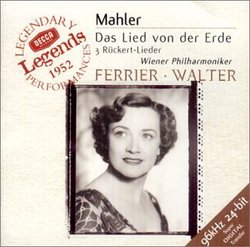| All Artists: Gustav Mahler, Bruno Walter, Kathleen Ferrier, Julius Patzak, Vienna Philharmonic Orchestra Title: Mahler: Das Lied von der Erde / Bruno Walter Members Wishing: 0 Total Copies: 1 Label: Decca Original Release Date: 1/1/1952 Re-Release Date: 11/14/2000 Genres: Pop, Classical Styles: Vocal Pop, Historical Periods, Modern, 20th, & 21st Century, Symphonies Number of Discs: 1 SwapaCD Credits: 1 UPC: 028946657621 |
Search - Gustav Mahler, Bruno Walter, Kathleen Ferrier :: Mahler: Das Lied von der Erde / Bruno Walter
 | Gustav Mahler, Bruno Walter, Kathleen Ferrier Mahler: Das Lied von der Erde / Bruno Walter Genres: Pop, Classical
![header=[] body=[This CD is available to be requested as disc only.]](/images/attributes/disc.png?v=430e6b0a) ![header=[] body=[This CD is available to be requested with the disc and back insert.]](/images/attributes/disc_back.png?v=430e6b0a) ![header=[] body=[This CD is available to be requested with the disc and front insert.]](/images/attributes/disc_front.png?v=430e6b0a) ![header=[] body=[This CD is available to be requested with the disc, front and back inserts.]](/images/attributes/disc_front_back.png?v=430e6b0a) |
Larger Image |
CD Details |
CD ReviewsIt should have six, maybe seven, stars! David Paisley | Lakewood, Ohio United States | 10/22/2001 (5 out of 5 stars) "Out of the many "Das Lied"s in my collection--starting with Bernstein/Fischer-Dieskau/King, purchased when I was a junior in high school, this is undoubtledly the nonpareil. I have owned this recording in one form or another for over thirty years--in fact, I even ordered a copy of Decca's previous CD remastering from England when I couldn't find it here, and so I was a tad hesitant to purchase another copy when this release came out; I suppose it was the three Ruckert songs that made me decide to purchase it. A quick comparison with the earlier CD sold me on this one right away. There is a clarity to the orchestra's detailing and to the singing that just wasn't there in earlier versions. The inclusion of the original cover art was a bonus, as well. This is a heartbreaker--Ferrier's wonderful dark voice is unequalled in any other performance I've heard--including Walter's earlier recording with Thorberg, as well as Christa Ludwig's with Bernstein, etc. Julius Patzak approaches his parts with a passionate abandon that I prize as well. If you care anything about Mahler, you must own this recording, along with EMI's latest re-release of Ferrier's Kindertotenlieder. There's nothing to compare. One of the greatest of great recordings, and better than ever!" Not a first choice, but still a must-have meltbanana | 08/07/2004 (4 out of 5 stars) "I own nine different recordings of Mahler's Das Lied Von Der Erde, and I would probably rate this somewhere in the middle, with Kubelik, Sanderling, and Klemperer ahead of it, and close to on-par with the Horenstein. This is an excellent and deservedly legendary performance. Patzak and Ferrier both give extremely artistic performances. There is great charisma and depth to their singing and interpretation of the words and melodies. However, technically, there are far better performances out there (they were both past their prime). Fritz Wunderlich, Peter Schrier, and Waldemar Kmentt as tenor and Janet Baker and Alfreda Hodgson as alto come to mind immediately. Bruno Walter gives a very moving reading of the song cycle, but the Vienna Philharmonic Orchestra does not perform very well. It sounds rather unrehearsed and unrefined (and not in a good "fresh" way). What you have here is a very moving, very magical performance of Das Lied Von Der Erde that should be heard by everyone. But it saddens me to think that many people would purchase this as their "only" recording of this piece (due to the justifiably positive reviews) and feel they can explore this piece sufficiently with it. I highly recommend checking out the Kubelik/Baker/Kmentt recording. It is an absolutely essential recording with a brilliant conductor, excellent orchestra and sound, the best alto performance available for this work (Baker!), and an excellent tenor. Klemperer and Sanderling give equally amazing readings with two of the best tenors you will ever hear perform this piece (Schrier and Wunderlich, respectively). Although I find this recording to be far inferior to the three mentioned above, I truly believe one must own several recordings of this work, and in that respect, this Walter/Ferrier deserves the shelf space." The best "Song" ever... Ytzan | Athens, GR | 04/15/2001 (5 out of 5 stars) "Walter, Ferrier. This alone could count towards this performance being excellent. But it's not. I had the very first encounter with Mahler when I was 14 through the introduction music of a radio program. I did n't know it then but it was the first notes of the Abschied. After a while I bought my first "Song" CD (the latter Walter version with the NYPO on Sony - a very good account also). Since then I have heard to more than ten interpretations including that of Bernard Haitink on Philips and a live with Agnes Baltsa and Fischer with the Hungarian State Orchestra - two really great accounts but still I haven't found that Ferrier feeling of Abschied. You can feel that she thinks it as her Swan song. Walter also just knows her so well - not the first time they were together in the "Song" - and the music making is unmatched since today. Not to forget Julius Patzak, a very characteristic voice that attributes to the greatness of this interpretation... But still this is a Ferrier CD. The sound have limitetions being mono (strings are a bit thin) but this can not abstract anything from the best MAHLER recording ever...."
|

 Track Listings (9) - Disc #1
Track Listings (9) - Disc #1